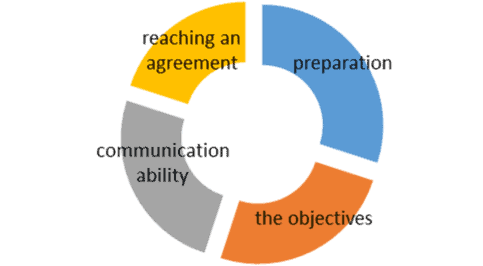
Successful negotiation is about discussion aimed at reaching an agreement
Emina Milišić, Office of Chief Economist Central Bank of Bosnia and Herzegovina

Interacting with International Financial Institutions is of great importance, especially for Central Banks, which often engage and take decisions on which the further path of an economy depends. Gaining a solid knowledge of the negotiation process, as well as experience in conducting negotiations, is crucial for the staff members who are responsible for such processes. In this blog post, I share some of the reflections I’ve made after participating at the BCC online course on interacting with International Financial Institutions.
Prepare yourself and your team
Preparation is the most important step in the process. Negotiators often fail to make an agreement or derive maximum benefit from their negotiation because one or both sides did not prepare effectively. It is very important that each team first prepare internally in order to establish objectives, define responsibilities, analyze threats, and review contingency plans. During the negotiation process it is very important that we trust each member of our team. Team members should understand their responsibilities fully, and any tasks assigned to them.
Have clear objectives: What are you trying to achieve? What are the objectives, and why?
In preparing for any negotiation, you must first of all determine your goals. What do you want from the negotiation? It is crucial that we fully understand all the issues that might arise from both parties. To prepare, you need to rely on intelligence, knowledge, but also research. It is one thing to prepare for negotiation within our own country with different domestic policy institutions, it is entirely different when we negotiate with an altogether different culture. It is crucial to gain as much understanding about the tactics of the other side and be prepared. If we don’t prepare wisely beforehand, we’re more likely to encounter a misunderstanding.

Make yourself and your position understood
Your goal is to make yourself and your position understood, and this relies on your communication ability. If one team fails to listen intently to the other team, negotiations could stall or become unproductive. During a negotiation process, all parties should speak directly to each other and should be prepared to explain problems, articulate shared and unshared interests and work together toward a fast resolution. Effective communication comes down to being prepared to listen to and respect the other person’s point of view and to make other person understand yours. For this, you need to communicate in a way that makes the other person want to listen. While it may sound basic to say that communicating effectively (both listening and talking) is crucial for an effective negotiation, it is however essential: in a negotiation so as to leave little room for communication breakdowns and misunderstandings.
Negotiation leads to compromise? – Your and the other side’s options
Last but not least, sometimes the key to success is to be willing to compromise on less important things in order to reach your main goal. Understand that the push-back you’re getting is just an opportunity to problem-solve in a way that satisfies your interests and the other party’s interests at the same time.
Conclusion – Don’t be afraid to ask for what you want
Negotiation ability is something that can always be worked on and refined. Proper preparation is a source of negotiating power because it enhances your ability to persuade the other side to agree to what you are asking for. International negotiations -especially in the framework of the Central Banks- must be understood as a continuous process with preparatory meetings in various regions of the world, with pre-, main-, and post-negotiations. Across these steps, the power relations can take different forms, shaping the final outcomes. Moreover, the result of the negotiation will also depend on the type of relationships that exists between the negotiating parties.
Negotiation is best learned through practice. This is why I think that the exercises we had during the course really gave a completely new perspective and new experiences that will mean a lot for our future negotiations that we will encounter in life.